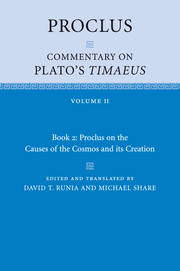III - The Uniqueness of the Cosmos: 436.4–458.11
Published online by Cambridge University Press: 30 June 2022
Summary
Is the Cosmos one or Many?
So, have we correctly called it one heaven, or would it have been more correct to speak of many, indeed an infinite number? (31a2–3)
General explanation: 436.6–437.25
On the one hand, this problem, [coming as it does] after what has just been said, observes [an appropriate] compositional sequence. For, because [Plato] has defined the cosmos as ‘a single (heis) visible living thing containing within itself all living things which are naturally akin to it’ (30d3–31a1), he was bound to judge this very point – [I mean], whether the cosmos is a single entity (hen ti) or not – worthy of consideration and comment. And, in fact, among the philosophers of nature some make it unique (heis), others many, [yet] others not only many but infinite in number. And, secondly (de), this [same] question also has a continuity with what has gone before that stems from the facts themselves. For, since the cosmos has been shown to be an image of the Living-Thing-itself (30c2–31a1), a ‘living thing endowed with soul and intellect’ (30b8), there was a need to put the finishing touch to the account of it by showing that it is also unique. In that way it would be shown that it is also a god, since it would have participated the Henad above Intellect. It was not possible just to call it a copy, because there are also other copies, some of them produced by nature, others by art; or a living thing, because there is also a multitude of particular living things; or ‘endowed with soul’, for a human being too is an image, and a living thing, and endowed with soul; or ‘endowed with intellect’, for both a demon and an angel are living things endowed with soul and intellect. Rather, although, for the reason I stated, he earlier left it unexpressed, he has now introduced [the property] which above all and primally belongs to divine beings, [namely], oneness and uniqueness. For everything whatsoever in the universe that is monadic is divine, because it bears, if it is lawful to say it, an image of the One.
- Type
- Chapter
- Information
- Proclus: Commentary on Plato's Timaeus , pp. 323 - 354Publisher: Cambridge University PressPrint publication year: 2008

